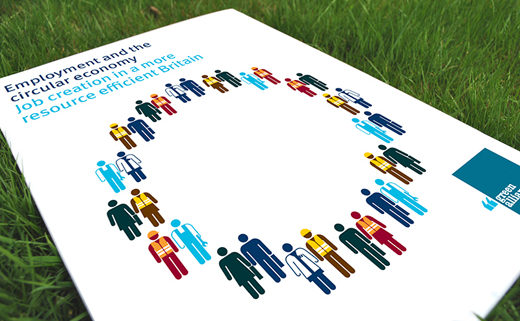In the news: A circular economy could create 200,000 UK jobs
Moving to a circular economy could create 200,000 jobs in the UK as more companies view discarded materials as valuable resources. This was the finding of a new report issued this January by the Green Alliance. The move could stimulate jobs in areas of high unemployment, boosting productivity and growth, the charity suggests.
According to the Guardian, Green Alliance director Matthew Spencer said parts of the economy were recycling in a way that dispensed with the traditional ‘take, make, waste’ model. He highlighted circular business models such as designing goods that last longer and can be repaired easily, as well as the importance of designing for disassembly.
“At a time when many are worried about where jobs will come from in future, it is a tantalising prospect to have a sector which offers a wide range of new jobs right across the country, especially in regions with high unemployment,” he said. “To be able to stimulate these new jobs in remanufacturing and reuse, we will need government to play its part in setting higher standards for product and resource recovery.”
Produced in collaboration with WRAP, the report, entitled ‘Employment and the Circular Economy’, details how the UK can adopt a more efficient approach to resource use while generating more jobs. It estimates that by 2030 there could be 205,000 extra jobs and a 54,000 drop in unemployment.
With Brussels set to strengthen waste and recycling regulations, the UK government could play a key role in promoting the importance of a circular thinking, Spencer believes.
“The biggest opportunity is in the EU circular economy package which is being renegotiated this year, but the UK will have to become an active champion of higher ambition or we could end up with no new policy drivers for investment,” he explained.

EU circular economy package moves slowly forward
Concerns were raised among green groups in December, when it appeared that the EU’s circular economy package – designed to accelerate the transition to a circular economy in Europe – could be blocked due to ‘anti-competitiveness’.
The package, presented in July 2014, includes an 80% recycling target for packaging by 2030 and a ban on sending recyclable materials to landfill by 2025. It also comprises non-binding ‘aspirational’ goals, including the phasing out of landfilling of all recoverable waste by 2030 and a 30% reduction of waste by 2025.
Supporters of the package include the Ellen MacArthur Foundation, whose research suggests that a circular economy could generate $1tn annually, ‘cradle to cradle’ carpet tile manufacturer Desso, and the Alliance for Beverage Cartons and the Environment.
“Helping more traditional ‘linear’ businesses to understand the business benefits of a more circular approach will be fundamental to the development of a progressive circular economy package,” says Nigel Hunton, MBA Polymers’ CEO. “And with more than half a million jobs already created by the recycling industry in the EU, it’s clear that we have a golden opportunity to expand our domestic recycling industries. This would both reduce the volumes of waste being exported to China and keep the economic value of waste in our own countries.”
For more on how MBA Polymers is contributing to the creation of a circular economy, please visit our website or read our new corporate responsibility report.

